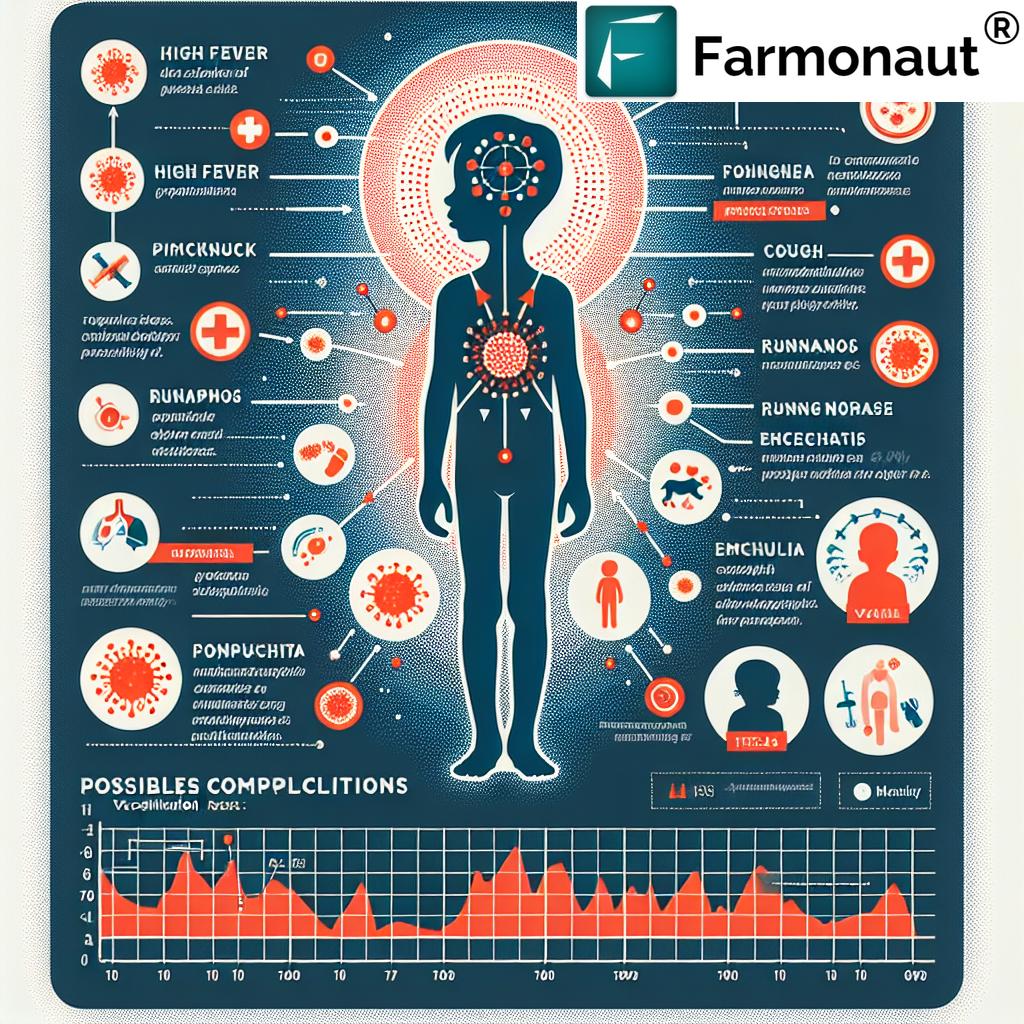Measles Outbreak in Texas: Understanding Symptoms, Risks, and Vaccination Importance for Public Health
“The current Texas measles outbreak is the largest in decades, spreading across multiple counties and into New Mexico.”
As we delve into the concerning measles outbreak in Texas, it’s crucial to understand the gravity of the situation and its implications for public health. This comprehensive blog post will explore the outbreak’s origins, symptoms, risks, and the critical importance of vaccination in preventing the spread of this highly contagious virus.
The Texas Measles Outbreak: A Growing Concern
The ongoing measles outbreak in Texas has rapidly become the largest the state has seen in decades. As of the latest reports, there are now 90 confirmed cases across seven counties in Texas, with an additional nine cases reported in neighboring New Mexico. This alarming spread has pushed Texas into record-setting territory, with more measles cases reported in the first two months of 2025 than in any full year since 1992.
The outbreak primarily affects unvaccinated individuals, highlighting the critical importance of maintaining high childhood vaccination rates. Health experts warn that dropping vaccination rates nationwide could lead to more outbreaks of measles and other preventable diseases.

Origins and Spread of the Outbreak
The outbreak is believed to have originated in a Mennonite community in Gaines County, Texas. The county seat, Seminole, is located near the New Mexico border, about 350 miles west of Dallas and 80 miles southwest of Lubbock. The first reported cases were in two children who were hospitalized with the illness.
From this initial point, the highly contagious virus has spread rapidly, crossing both county and state lines. The spread is primarily occurring through unvaccinated individuals, though some vaccinated people have also been affected, albeit with generally milder symptoms.
Understanding Measles: Symptoms and Risks
“Measles can lead to serious complications, with pneumonia being a significant risk for infected individuals.”
Measles is a highly contagious viral illness characterized by several distinct symptoms:
- Coughing
- High fever
- Red, watery eyes
- Characteristic skin rash
While many children who contract measles will recover, the illness can lead to severe complications. According to the Centers for Disease Control and Prevention (CDC), about 20% of unvaccinated people who get measles will be hospitalized. The most significant complication, particularly in young children, is pneumonia, which is the leading cause of death in measles cases.
The Importance of Vaccination
The current outbreak underscores the critical importance of vaccination in preventing the spread of measles and other preventable diseases. The measles vaccine, typically administered as part of the MMR (Measles, Mumps, Rubella) vaccine, is highly effective. The recommended two-dose regimen provides about 97% protection against the virus.
Here’s a comparison of vaccinated versus unvaccinated populations:
| Factor | Vaccinated Individuals | Unvaccinated Individuals |
|---|---|---|
| Risk of Contracting Measles | Very Low (3%) | Very High (90%+) |
| Severity of Symptoms | Generally Mild | Potentially Severe |
| Hospitalization Rate | Low (<5%) | High (20%) |
| Risk of Complications | Very Low | Significant |
This data clearly illustrates the protective power of vaccination against measles.
Public Health Response and Vaccination Efforts
In response to the outbreak, local health authorities have ramped up vaccination efforts. The South Plains Public Health District is providing measles vaccinations at 704 Hobbs Highway in Seminole for residents of Gaines County. Other local health authorities in the region have also offered vaccinations, and residents can contact their doctors or pharmacies to inquire about vaccinations.
These efforts are crucial in containing the spread of the virus and preventing future outbreaks. However, the success of these initiatives relies heavily on public participation and awareness.
Impact on Local Communities and Healthcare Systems
While the outbreak has raised significant concerns, local medical providers report that the cases have not yet strained the healthcare system. Dr. Lara Johnson, chief medical officer at Covenant Children’s Hospital in Lubbock, stated that her hospital has admitted around a dozen children with measles. Some have needed higher-level care, but none have been critically ill.
However, the outbreak has caused anxiety among parents and community members. This anxiety is partly due to the unfamiliarity of measles to many American adults, as widespread vaccination had nearly eliminated the disease in the United States.
The Broader Implications: A Warning for the Future
The Texas measles outbreak serves as a stark reminder of the importance of maintaining high vaccination rates. As childhood vaccination rates drop nationwide, health experts warn that we could see more outbreaks of measles and other preventable diseases.
Dr. Peter Hotez, dean of the National School of Tropical Medicine at Baylor University, points out that we’re entering what was historically the “measles season” before widespread vaccination. This timing could potentially accelerate the spread of the virus if vaccination rates remain low.

The Role of Community Education and Awareness
Addressing the outbreak effectively requires not only medical intervention but also community education and awareness. It’s crucial to dispel misinformation about vaccines and provide accurate, science-based information to the public.
Health authorities are working to educate communities about the importance of vaccination, the risks of measles, and the safety of the MMR vaccine. This education effort is particularly important in areas with low vaccination rates or where vaccine hesitancy is high.
Global Context: Measles Outbreaks Worldwide
The Texas outbreak is not an isolated incident. Measles outbreaks have been occurring globally, often in areas with low vaccination rates. These outbreaks serve as a reminder that infectious diseases don’t respect borders and that global vaccination efforts are crucial for public health worldwide.
The Science Behind Measles Transmission
Understanding how measles spreads is crucial in efforts to contain the outbreak. Measles is one of the most contagious viruses known to science. It can spread through the air and on surfaces, and can remain infectious in the environment for up to two hours after an infected person has left an area.
This high level of contagiousness means that unvaccinated individuals have an extremely high chance of contracting measles if exposed. According to Dr. Paul Offit, director of the Vaccine Education Center at Children’s Hospital of Philadelphia, “You don’t have to have direct face-to-face contact with someone who has measles. You just have to be in their airspace within two hours of them being there.”
Measles Complications: Beyond the Initial Symptoms
While the initial symptoms of measles can be severe, it’s the potential complications that make this disease particularly dangerous. Some of the serious complications include:
- Pneumonia (the most common cause of death in young children with measles)
- Encephalitis (swelling of the brain)
- Severe diarrhea and related dehydration
- Ear infections that can result in permanent hearing loss
Pregnant women are at higher risk of complications if they contract measles, particularly if they are unvaccinated. These complications can include premature birth or low birth weight for the baby.
The Economic Impact of Measles Outbreaks
Beyond the immediate health concerns, measles outbreaks can have significant economic impacts. These can include:
- Increased healthcare costs for treating measles cases and complications
- Lost productivity due to illness and caregiving requirements
- Costs associated with public health response and vaccination campaigns
- Potential impact on tourism and local businesses in affected areas
These economic factors underscore the importance of prevention through vaccination, which is far more cost-effective than managing outbreaks.
The Role of Herd Immunity in Preventing Outbreaks
Herd immunity plays a crucial role in preventing the spread of measles and protecting those who cannot be vaccinated due to age or medical conditions. For measles, experts estimate that about 95% of the population needs to be immune to achieve herd immunity.
When vaccination rates fall below this threshold, it creates opportunities for the virus to spread, particularly in pockets of unvaccinated individuals. This is why maintaining high vaccination rates across all communities is so important for public health.
Addressing Vaccine Hesitancy
One of the challenges in maintaining high vaccination rates is addressing vaccine hesitancy. This hesitancy can stem from various sources, including misinformation, distrust in medical institutions, or concerns about vaccine safety.
Addressing these concerns requires a multifaceted approach:
- Providing clear, accurate information about vaccine safety and efficacy
- Addressing common myths and misconceptions about vaccines
- Ensuring healthcare providers are well-equipped to discuss vaccination with patients
- Engaging community leaders and influencers to promote vaccination
By addressing vaccine hesitancy, we can work towards increasing vaccination rates and preventing future outbreaks.
The Role of Public Health Policy
Public health policies play a crucial role in preventing and managing disease outbreaks like the current measles situation in Texas. Some key policy areas include:
- Vaccination requirements for school entry
- Public health surveillance systems to detect outbreaks early
- Funding for vaccination programs and public health infrastructure
- Policies to ensure equitable access to vaccines
Effective public health policies can help create an environment that supports high vaccination rates and rapid response to disease outbreaks.
The Future of Measles Prevention
As we look to the future, several factors will be crucial in preventing measles outbreaks:
- Continued research into vaccine development and delivery methods
- Improved global vaccination efforts to reduce the risk of imported cases
- Enhanced surveillance systems to detect outbreaks quickly
- Ongoing public education about the importance of vaccination
By focusing on these areas, we can work towards a future where measles outbreaks are rare occurrences rather than growing concerns.
Conclusion: A Call to Action
The measles outbreak in Texas serves as a stark reminder of the importance of vaccination in protecting public health. As we’ve explored in this blog post, measles is a serious and highly contagious disease that can have severe complications, particularly for children and vulnerable populations.
We urge all readers to ensure they and their family members are up-to-date on their vaccinations. If you’re unsure about your vaccination status, consult with your healthcare provider. For those in affected areas, stay informed about local health advisories and follow recommended precautions.
Remember, vaccination is not just about individual protection – it’s about protecting our entire community, especially those who cannot be vaccinated due to age or medical conditions. By maintaining high vaccination rates, we can prevent future outbreaks and protect public health for all.
FAQ Section
Q: What are the symptoms of measles?
A: The main symptoms of measles include high fever, cough, runny nose, red, watery eyes, and a characteristic rash that typically appears 3-5 days after the first symptoms.
Q: How effective is the measles vaccine?
A: The measles vaccine is highly effective. Two doses of the MMR vaccine are about 97% effective at preventing measles.
Q: Can you get measles if you’ve been vaccinated?
A: While it’s possible, it’s very rare. Vaccinated individuals who do contract measles typically experience milder symptoms.
Q: How long does measles immunity last after vaccination?
A: Immunity from the measles vaccine is long-lasting. Most people who receive two doses of the vaccine will have lifelong immunity.
Q: What should I do if I think I’ve been exposed to measles?
A: If you think you’ve been exposed to measles and are not vaccinated, contact your healthcare provider immediately. They may recommend post-exposure vaccination or other preventive measures.
As we conclude this comprehensive look at the Texas measles outbreak, let’s remember that public health is a collective responsibility. By staying informed, getting vaccinated, and supporting community health initiatives, we can all play a part in preventing the spread of measles and other preventable diseases.
Stay healthy, stay informed, and let’s work together to protect our communities.



